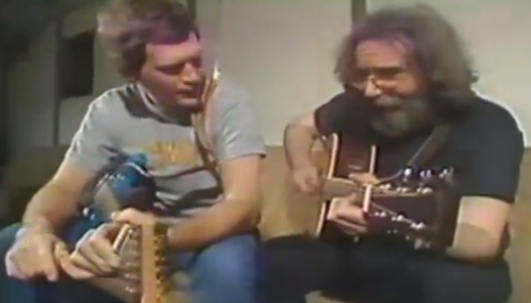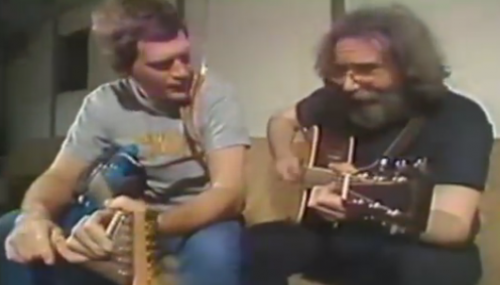
Jerry Garcia, born August 1, 1942, was quite possibly the most fame-averse rock star ever. For the Grateful Dead’s lead guitarist there was the music and then there was everything else—and most of that “everything else” was at best a necessary evil if not a nuisance. Garcia even skipped out on his own induction into the Rock and Roll Hall of Fame, finding the very idea of a Rock and Roll Hall of Fame silly.
Once, when asked how he felt about the countless “Dead Heads” who practically worshipped him, Garcia said, “Fame is an illusion. I know what I do and I know about how well I do it, and I know what I wish I could do. Those things [like fame] don’t enter my life. I don’t buy into any of that stuff. I can’t imagine who would.”
Nonetheless, Garcia understood that promotion was one of those things that rock stars did, and he gave numerous interviews throughout his career, engaging fully with his inquisitors and displaying his intelligence and, yes, undeniable charm. Occasionally—not often but sometimes—Garcia, with or without the Dead, even appeared on television, notably performing with the band on Hugh Hefner’s Playboy After Dark in 1969 and twice on Saturday Night Live in the early ’80s.
Like many other classic rockers, Garcia was a fan of David Letterman, making four appearances in all on the talk show host’s Late Night (later called Late Show), accompanied for the first three of those by the Dead’s other guitarist and lead vocalist, Bob Weir. (For the last, in 1993, Garcia appeared with mandolinist David Grisman, a frequent collaborator.)
The first Letterman appearance, airing on April 13, 1982, during the band’s spring tour, is the classic. It began with a hilarious half-minute backstage snippet of Letterman “teaching” Garcia the guitar chords to “Proud Mary,” then continued with a sit-down interview, a smiling (and smoking) Garcia recalling—as best he could—the Dead’s early days playing for the Acid Tests. “At the time,” he tells Letterman, “it seemed that things were gonna change real fast, because there was this amazing momentum.” When Letterman asks the guitarists whether they feel somewhat isolated by spending much of their time surrounded by people from their own organization, Garcia doesn’t hesitate to admit that he does, but goes on to praise the band’s followers. On the phenomenon of some of those audience members recording and trading tapes of their live performances, the band doesn’t mind at all, he says: “When we’re done with it, they can have it.”
Finally, after six minutes of cheery repartee, Garcia and Weir pull out the acoustic guitars and play a couple of cover tunes from the Dead’s early repertoire, an extended take on “Deep Elem Blues” and “The Monkey and the Engineer,” separated by another interview segment.
They were just a couple of years past the midway point in the Dead’s 30-year run when Garcia and Weir first visited Letterman. A true taste of fame would follow five years later, when the Grateful Dead experienced their first and only Top 10 single, “Touch of Grey.” Their already enormous audience would expand even more, but the Dead would just keep on doing what they’d always done—playing their music—until August 9, 1995, when Garcia’s substance abuse and other bad habits—which some said were exacerbated by his utter disdain of the responsibilities that came with being the figurehead at the center of the Dead’s universe—finally caught up to him. Garcia’s death put a sudden end to one of the most extraordinary tales in rock history—for a while anyway. Although he was gone, as one of their songs went, “The Music Never Stopped.”
Our Classic Video…
Letterman was born April 12, 1947. The final episode of his long-running series aired May 20, 2015. It was his 6,080th program, surpassing his idol and mentor, Johnny Carson, as the longest-serving late night talk show host in U.S. television history.
Related: August 9, 1995: Jerry Garcia Dies
The enormous Dead catalog is available in the U.S. here and in the U.K. here.

